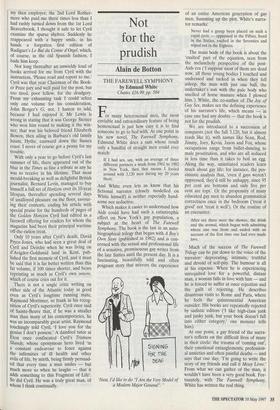Not for the prudish
Main de Botton
THE FAREWELL SYMPHONY by Edmund White Chatto, £16.99, pp. 504 or many heterosexual men, the most enviable and extraordinary feature of being homosexual is just how easy it is to find someone to go to bed with. At one point in his new novel, The Farewell Symphony, Edmund White does a sum whose result only a handful of straight men could ever match:
If I had sex, say, with an average of three different partners a week from 1962 to 1982 in New York, then that means I fooled around with 3,120 men during my 20 years there.
And White even lets us know that his fictional narrator (closely modelled on White himself) is neither especially hand- some nor seductive.
Which makes it easier to understand how Aids could have had such a catastrophic effect on New York's gay population, a subject at the heart of The Farewell Symphony. The book is the last in an auto- biographical trilogy that began with A Boy's Own Story (published in 1982) and is con- cerned with the sexual and professional life of a sensitive, promiscuous gay writer from the late Sixties until the present day. It is a fascinating, beautifully told and often poignant story that mirrors the experience 'Next, I'd like to do "I Am the Very Model of a Modern Major General'. ' of an entire American generation of gay men. Summing up the plot, White's narra- tor remarks:
Never had a group been placed on such a rapid cycle — oppressed in the Fifties, freed in the Sixties, exalted in the Seventies and wiped out in the Eighties.
The main body of the book is about the 'exalted' part of the equation, seen from the melancholy perspective of the post- Aids era CI suppose most of them are dead now, all those young bodies I touched and undressed and tucked in when they fell asleep, the man with just one ball, the undertaker's son with the pale body who smelled of horse manure when I plowed him.') White, the co-author of The Joy of Gay Sex, makes sex the defining experience of his narrator's life, which means — in case one had any doubts — that the book is not for the prudish.
We are introduced to a succession of conquests (not the full 3,120, but it almost reads like it), with names like Sean, Rod, Jimmy, Joey, Kevin, Jason and Fox, whose occupations range from ballet-dancing to male prostitution, and who are all seduced in less time than it takes to boil an egg. Along the way, uninitiated readers learn much about gay life: for instance, the pes- simistic analysis that, 'even if gays weren't oppressed, they'd still be unhappy, since 95 per cent are bottoms and only five per cent are tops'. Or the propensity of many educated gay men to abandon grammatical correctness once in the bedroom ('treat it good' not 'treat it well'). Or the routine of an encounter:
After sex there were the shower, the drink and the avowal, which began with admitting where one was from and ended with an account of the first time one had ever made love.
Much of the success of The Farewell Trilogy can be put down to the voice of the narrator: deprecating, intimate, truthful and devoid of self-pity. The humour is all at his expense. When he is experiencing unrequited love for a powerful, distant man, a woman falls in love with him — and he is forced to suffer at once rejection and the guilt of rejecting. He describes disastrous visits to Rome and Paris, where he feels the quintessential American outsider. His books are repeatedly rejected by sadistic editors CI like high-class junk and junky junk, but your book doesn't fall into either category,' one monster tells him).
At one point, a gay friend of the narra- tor's reflects on the difficult lives of many in their circle: the trauma of 'coming out', their emotional entanglements, profession- al anxieties and often painful deaths — and says that one day, 'I'm going to write the story of my friends and call it Messy Lives.' From what we can gather of the man, it wouldn't have been a very good book. For- tunately, with The Farewell Symphony, White has written the real thing.


































































 Previous page
Previous page